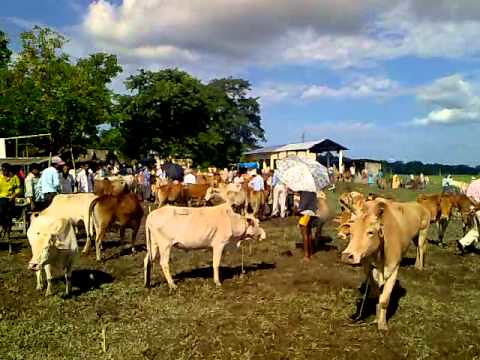By Shiva Thorat, TwoCircles.net
Guna Pawara: 40-year-old Adivasi farmer lives in Sangavi, about 25 kilometres from Shirpur tehsil in Dhulia district of Northern Maharashtra. This region is also known as Khandesh. Guna just barely survives by farming. He has been growing millet and cotton for the past two to three years and he owns a few bulls. Recently, on seeing that his bulls have become older, he planned to sell his older pair and buy a new pair of bulls at Shirpur Bullock Market.
This market is famous in the area, held every Monday and has been the place to go for selling and buying of animals, groceries, and other commodities. He has made the trip to the Market now a few times, to sell and buy bulls. This time, again, he made the journey to Shirpur Bullock Market to try to sell his pair of bulls.

On reaching the market, Guna approached a broker who told him that he cannot sell his bull now and he better take them back home. Unaware of the Beef Ban law and its implication on his livelihood, Guna was taken aback. Why can’t he sell his bull, he wondered, and if he can not sell them who will take care of them?
Guna was obviously angry, “What are these politicians doing, God knows. To see to the needs of family, I need to sell my bulls, but I have been told by authorities that because of some new law, I cannot. What does that mean, what should I do now?”
Disappointed Guna had no option but to go back. When he had come to Shirpur Bullock Market he had hired a mini truck for carrying his bulls and now he had to walk all the way back with his bulls as now he didn’t have enough money to pay for a ride back.
Guna had expectations from the anticipated sale at Shirpur market. He muttered that he had thought that he would be able to meet all his immediate family needs. He had to purchase the seeds for the sowing after first rain in June. He had to buy clothes for his wife and son. His daughter’s marriage was coming soon so he had to invest some money into her ornaments. Everything had gone awry.
Shehjan Sheikh, 50-year-old from the Khatik (butchers) community who sells beef at Shirpur told TCN that “Guests coming to attend the marriages, programs and ceremonies are returning in anger just because no beef is being served at meals. “Everything is stuck and how I am to live I cannot understand !”
When farmers like Guna in Khandesh sell cow-bulls in the period of April and May, butchers like Shehjan Sheikh purchase them and see to the other needs of society. This has practically been a ritual for their communities.
The ‘Beef Ban’ is not only affecting communities like Khatiks, the butchers, Chamars and Marwadis who work with and deal in leather, and farmers like Guna Pawara all feel like victims of the new Maharashtra Animal Preservation (Amendment) Act that was first introduced in 1976 to ban cow slaughter, but heavily amended to ban slaughter of bulls and bullocks too, by Chief Minister Devendra Fadanvis in 2014. Fadnavis explained, “Killing the cattle and her family should be illegal as it offends the Hindu religion’.
‘Beef Ban’, reaping, chopping cattle’s, bulls and selling-purchasing them to the slaughter houses is now a punishable offence in the society but it comes with deep social guilt too.This stigmatization leads to mob lynching of Muslims like killing of Mohammad Akhlaq at Dadri in Uttar Pradesh. It is also seen in Khandesh that the Hindu right-wing organizations like Vishwa Hindu Parishad (VHP) and Bajrang Dal are widening their membership in the name of ‘Gaumata Sarankshan Samiti’ (Mother-Cow Protection Association). They have already opened some 30 chapters around Shirpur area. Their activities include threatening Shirpur Bullock Market brokers and patrolling to “capture” illegal sellers and beef-consumers.
On the border of Maharashtra, police are stationed on the highways and have to pay attention carefully. They are working with VHP and Bajrang Dal to identify “suspects who are selling cows” and arresting them. There are cases of beating some truck drivers to death and lynching of young Muslim cattle-herders on suspicion.
Some days back Shiv Sena spokesperson Manisha Kayande stated that “Maharashtra border should be protected because there are chances of beef importing”. However, this increased border protection and inspecting vehicles does not seem to the implemented with police but with the ‘Gaumata Sarakshan Samitis’. Shirpur is on the border of Madhya Pradesh and Maharashtra. Madhya Pradesh, a BJP ruled state, has also banned the slaughter of bulls and bullocks. Both states have recorded increase in the cases of violence and crimes related to bull slaughter. In an informal meeting, Mr Khonde, who works in the police department showed his pity and stated that “If Shirpur becomes so communal then will have riots in a few days.”
The judiciary, police and right-wing organizations have enforced policies that further affect oppressed communities like Dalit, Adivasis and Muslims in Shirpur.
